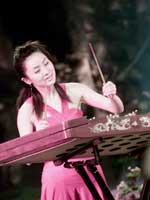 Vanessa-Mae Vanakorn Nicholson took the world of classical
music by storm.
Vanessa-Mae Vanakorn Nicholson took the world of classical
music by storm.
Bond, a British quartet dubbed the "classical Spice Girls," thrilled Beijing
two years ago.
Now comes the 12 Girls Band, which is made up of a dozen classically trained
young players of Chinese traditional instruments such as the erhu, guzheng,
pipa, dizi, yangqin, tuliang and hulusi.
After touring Japan and Hong Kong, the band has returned to conquer the
Chinese mainland, where it was born in June 2001.
The band will give two performances featuring folk music collected, composed
or arranged by Wang Luobin (1913-96) at the Beijing Exhibition Hall Theatre this
Friday and Saturday.
China's most well-known folk musician of the 20th century, he devoted his
entire life to collecting, preserving and promoting the folk music of western
China. Taking up the task in 1937, he has scored and arranged more than 1,000
popular traditional folk songs such as "At a Place Far Away," "Alamuhan," "The
Flowers and a Young Man" and "Daban City's Girl."
At the two concerts, the audiences will get to hear all these familiar
melodies but with a different flavour.
This is because 12 Girls Band is not your usual folk or traditional
instrumental band. They do not play folk music in the traditional way.
Visual music?
 Vanessa-Mae Vanakorn Nicholson describes her music as
"violin techno-acoustic fusion," so it seems reasonable enough to call the 12
Girls Band's music "folk techno-acoustic fusion," or impresario Wang Xiaojing's
simpler "visual folk music."
Vanessa-Mae Vanakorn Nicholson describes her music as
"violin techno-acoustic fusion," so it seems reasonable enough to call the 12
Girls Band's music "folk techno-acoustic fusion," or impresario Wang Xiaojing's
simpler "visual folk music."
"The original idea was to produce a show pleasant to the eyes as well as the
ears," says Wang. "I think people come to a show not only to listen but to look
as well. So I chose some pretty girls, dressed them in fashionable outfits and
topped it all off with fantastic stage design and lighting."
As for the music, the 12 girls play a new style that combines traditional
Chinese instruments, pop beats, a touch of jazz and elements of other music
forms from around the world, including rock and hip-hop.
Like Vanessa Mae and Bond, 12 Girls Band brings action and sex appeal into
the classical concert hall.
All this should be attributed to Wang Xiaojing, the general manager of
Beijing Century Stardisc Culture Spread Co Ltd, a man who always wears dark
brown sunglasses to keep others guessing what's on his mind, and whose rigid
face never gives any sign of a smile to the public.
Before discovering these girls, the veteran impresario had turned a number of
singers - some talented some not - into stars.
Winners who have benefited from his help include singers Luo Qi, Chen Lin,
Luo Bing and rock band The Compass, but the biggest name is Cui Jian, the
godfather of Chinese rock'n'roll. Wang worked as Cui's agent in the 1980s and
helped Cui produce two albums.
 "Despite his dark brown glasses, Wang sees performers'
potentials very clearly," says Song Xiaoming, a lyricist and one of Wang's
friends.
"Despite his dark brown glasses, Wang sees performers'
potentials very clearly," says Song Xiaoming, a lyricist and one of Wang's
friends.
Wang brought the commercial sensuality of the pop and rock scene to the often
sterile world of traditional music and folk music in 1997.
"I work in the music industry because I love music. I have listened to all
kinds of music, both Chinese and Western, from rock and pop to jazz, and folk -
the music of the world. A few years ago, I realized that folk music is one of
the main sources of music in the world. So since 1997 I have been thinking of
ways to utilize Chinese folk music," Wang said.
It has by no means been easy. Wang talked with some friends in the business,
and they told him that it would be hard to combine five-tone Chinese music with
Western orchestration. Many people have tried but few have had any success.
Wang refused to accept defeat.
In 1998, he went to a concert in Beijing's Poly Theatre where a Japanese
pianist co-operated with Chinese erhu player Wen Jinlong. The latter stood
beside the piano to play the traditional Chinese instrument. The performance
inspired Wang.
But he wanted to produce a band, not an erhu soloist.
Talking about this, Wang waxed poetic about his idea with the girls: "The 12
Girls Band is a brand. Each of the 12 girls is a note in the score. People know
the 12 Girls Band but have no clear idea who is who. Whenever one of them leaves
the band, I will find someone to take her place. There are thousands of pretty
young women learning traditional instruments."
Then he met Guo Yaqing and was impressed by his arrangements of folk music
pieces. Subsequently, Guo became the band's first music director and composed
and arranged several pieces of music for the girls.
Now Guo has been replaced by Liang Jianfeng, another young composer, whom
Wang discovered on a concert on TV which featured Liang's arrangement of Wang
Luobin's folk song "Alamuhan."
Liang has arranged more works by Wang Luobin and some popular Western and
Japanese songs with electronic and percussion, which has enriched the band's
repertoire.
In May 2001, Wang started recruiting girls for the band, attracted more than
100 girls from the China Conservatory of Music, the Central Conservatory of
Music and the Central University of Nationalities.
Wang held a three-round audition for the applicants. The first was a test on
instrument playing; this was followed with a personal interview; and the last
test was playing a piece at the recording studio.
Within one month, the 12 Girls Band was formed. Each member is able to play
two or three instruments and some even more than that.
Over the following three months, the girls received special training to
create their special performance style, for example, practising playing
instruments standing in a room with floor-to-ceiling mirrors on all four walls.
Yang Songmei, a yangqin player who graduated from the China Conservatory of
Music, said: "It's hard for us to play standing up, because we have spent so
many years learning to play while seated. But in front of the mirrors, we can
see immediately if our posture is effective or not."
Mixed comments
On October 5, 2001, the 12 Girls Band gave its debut performance at Beijing's
Century Theatre.
Not as spicy as Vanessa-Mae, who isn't shy in the spotlight and runs across
the stage while playing, the 12 girls stand or sit to play in worked-out poses,
moving gently to the rhythms of the music.
As Wang expected, the show got mixed reviews.
Some said the audience watched the girls rather than listening to their
music.
"The show is something like a big party, luxurious and full of life, although
it's hard to tell whether it's a Chinese or a Western party. Or it is something
like a Chinese wine spiced with a shot of cognac. The cognac masks the original
rich scent of the Chinese wine but you cannot say it is not wine," said Fu Xin,
an audience member at the debut performance.
The new style of instrumental pop hasn't been a hit with music critics and
classical purists who blast the 12 Girls Band for degrading the traditional
instruments with their playing.
"Their music combines traditional and folk elements with new-age techno but I
don't think they produce a high quality sound that retains the aesthetic beauty
for which Chinese traditional music and folk music is renowned," said Piao
Dongsheng, conductor and chairman of the China Traditional Orchestra Society.
Composer Ye Xiaogang said: "The idea is innovative and to be commended.
However, the music itself does not sound very good. There are many problems with
the scores. Music itself is ultimately what a band is about, no matter how you
package and promote it. The way of playing, the costumes and the lighting are
all secondary. You cannot imagine a good play without an appealing story;
similarly, a band cannot survive without a good repertoire."
Composer Li Lifu does not think what Wang has done makes any contribution to
the development of Chinese folk music. "In terms of instruments, techniques of
playing and composing, their music offers nothing new. As for the way of
playing, such as standing to perform, it's very superficial. I wish I had
compliments to offer about their technical and artistic level, but I don't."
But not everyone disapproves. Erhu player Yan Jiemin praises Wang's bold
venture and says he offers these young players a great chance to perform. "This
could help folk music enter the market and help win converts to the genre. But I
do not think it has much to do with developing folk music. They just play the
traditional instruments."
Wang, an impresario not a musician, has succeeded in attracting people's
attention to the usually calm and tranquil traditional music scene.
After the premiere, the 12 Girls Band was invited to perform on a number of
TV programmes including the 2002 China Central Television Spring Festival
Variety Show, which is China's most popular live broadcast on Spring Festival
Eve.
Warner China signed a contract with the band and cut its debut album
"Charming Music" in February 2002.
However, Wang's ultimate target market is not China.
Last February, the 12 Girls Band signed a contract with Japan's Platia
records, and 12 Girls Band rose to popularity at an incredible speed.
Its albums are put on the bestselling shelves in record stores and its fans
in Japan range from 20 to 60 years of age.
In Japan, the album "Beautiful Energy," which was released last July, has
sold 2 million copies and topped the sales charts. Their album "The Miracle" has
sold 380,000 copies and a live concert album has sold 200,000 copies.
With multi-platinum sales and top-of-the-chart standing in Japan, the 12
Girls Band made a name for itself as China's most successful musical export of
the year 2003.
According to Wang, more than 1,000 Japanese fans have booked tickets to the
Beijing concerts. They will fly in to applaud the 12 Chinese girls.
Girls' view
This January, the band gave four sold-out shows in Hong Kong, which again
raised hot discussion in music circles in China. This time the girls themselves
joined in the debate.
"We are not content to allow the exuberance of youth to be reined in by the
stringency of traditional music. So we enjoy playing alternative music that
combines the use of acoustic and electric instruments, although there is always
controversy when a traditionally trained player strays from traditional music,"
said Yin Yan, one of the 12 girls.
Yin learned to play erhu at the age of 8 and was studying at the China
Conservatory of Music.
"Young people of our age like our music. It's natural that somebody familiar
with traditional music will not readily accept our new style," said Yin.
Zhou Jiannan, a guzheng player from the Central Conservatory of Music,
compares playing classical repertoire to climbing high mountains. "Many
classical works are too deep and heavy to be interpreted easily. It's something
like climbing mountains. Only a few can reach the summit while the majority have
to struggle to get even half way. Our music is really like 'playing.' I feel
free and relaxed."
"We can introduce fans of pop and folk music to one another, as well as
giving a home to those who had long been fans of both," said Liao Binqu, who
graduated from the Central University of Nationalities and can play the dizi,
bawu, xiao, hulusi and tuliang.
Pipa player Zhong Bao who loves Nicole Kidman and jazz said: "We all cherish
the chance to perform as a team and to try a new artistic form. We've just got
to keep improving and creating good music; otherwise, we will lose our appeal."
As the news of their Beijing concerts spreads, more and more local people are
showing an interest in the band. Their albums sell well in the record stores.
And imitator bands have popped up in some venues.
"I initially purchased the CD 'Miracle' without really knowing what the 12
Girls Band was all about. But all the pieces in the album are fun to listen to
and have great rhythms. The players have excellent tone quality and resonance,"
said Feng Qiwu, a 26-year-old company clerk.
But the debate seems never to stop.
"I have to admit that Wang is a clever and successful agent. When I travelled
to Hong Kong, and to Japan and Singapore recently, I could hear the band's music
in taxis, pubs and hotels," said Jin Zhaojun, Beijing-based music critics.
"But is it a fad or a style that is here to stay? Who knows. Its biggest
problem is composing. Liang is good, but he alone is not enough and his music
lacks variety."
Lyrist Song Xiaoming said the 12 Girls Band adds a bright colour to Chinese
traditional and folk music. "But only a colour, it's not the mainstream and can
never satisfy the high-brows."
The fame of the 12 Girls Band is so far limited to Japan and China. Wang has
yet to make any kind of impact in the music market in the rest of the world,
such as in Europe, or in the United States.
Wang has already released the album "Glory" in the United States and Spain,
and is negotiating a US tour with local performance agents.
"Zhang Yimou took Gong Li up the red carpet at the Academy Awards, and I
would like to take the 12 Girls Band up the red carpet of the Grammys" he said
with confidence.
But will he succeed?
It really does not depend on how far Wang is prepared to back the band, and
neither does it matter how charming the 12 girls look. The key point is whether
their music has audience appeal.
Why not invite Tan Dun, Chen Qigang or Guo Wenjing to compose for them?
Someone suggested this and it sounds like a good idea.